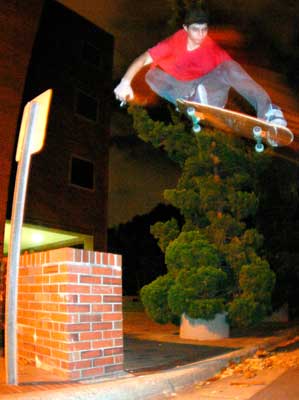His jeans are torn and his hair is long. He’s weaved his way between you and your friend while you’re walking to class and he’s most likely broken a bone sometime in the past.
He is the typical N.C. State skateboarder, and his numbers are decreasing.
“[The University is] kind of taking away from skateboarding, changing out benches and putting up Skatestoppers,” Travis Knapp-Prasek, owner and operator of SkateNC, said. SkateNC is an online community and forum for local skaters to gather and post videos and messages about skating and about the skate life in general.
“The only people who have had real problems with it are the actual police; the students and teachers have always just sat back and watched and enjoyed it,” Knapp-Prasek said.
As stated on the official Skatestopper Web site, Skatestoppers are “specially designed brackets that deter unwanted skating/biking.” N.C. State took measures to cut down on the damage caused by skateboarders by installing these objects around campus. By placing Skakestoppers on handrails and benches, grinding and other potentially damaging tricks done by skateboarders are put to a stop. The University also removed certain benches as another deterrent to skaters.
“We aren’t out to keep people from skating, our job is just to advise people of the current policy,” Sgt. Jon Barnwell, of Campus Police, said.
Police are not targeting all skaters, according to Barnwell, just the ones who damage campus or put themselves at danger with their skateboards and tricks.
“Skating on campus isn’t illegal, just the way you skate can be,” Barnwell said. “No jumping, grinding or riding on things, such as benches.”
Possible punishment for skaters includes citations, $50 fines and referrals to the Office of Student Conduct. Barnwell said the NCSU Board of Trustees supposedly revamped the on-campus skating policy for the University at their meeting Wednesday. Adam Parsley, a sophomore in psychology, isn’t looking forward to the new regulations.
“I’ve heard that their new rules are supposed to be a lot tougher,” Parsley said.
Parsley, a skater for six years, skates around campus frequently and said he has had one or two encounters with the police.
“[Campus Police] will stop you if they see you doing tricks but if you are really apologetic and nice they will let you go with just a warning,” he said.
Some skaters use longboards — skateboards that are longer with bigger wheels that are specifically designed for cruising and not tricks — to get around campus and also just for fun.
Brian Fromal, a sophomore in construction engineering and management, said he uses his longboard to “get around campus all the time and I’ve never had any problems with the cops.”
Sergeant Barnwell is quick to point out that “skating as a means of transportation is fine, skaters just need to watch out for pedestrians.”
“We are just trying to keep people safe and informed,” Barnwell said.
A possible skate park in Raleigh might be a solution to both authorities’ and skaters’ problems. Supposedly the Raleigh Parks and Recreation Department has the funds to build the skate park, they just can’t find a location.
“I’ve heard possibly it could be in Laurel Hills Park, off of Blue Ridge Road,” Knapp-Prasek said, “This summer they are supposed to put it into action.”
Skaters hope the City of Raleigh will take the next step and get the ball rolling on the skate park for their sake, as well as the police’s.








